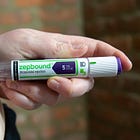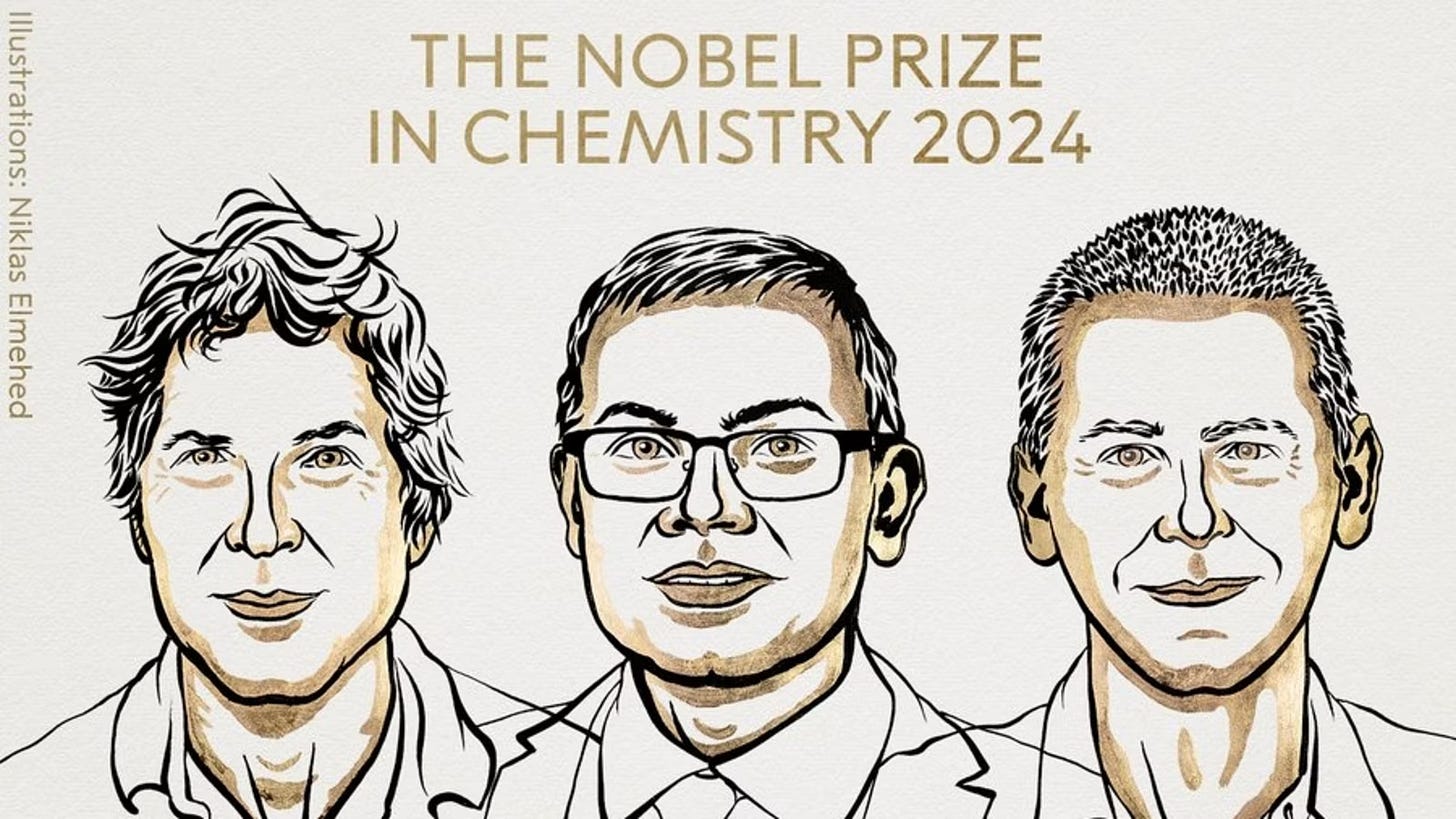This Week in Biotech #18
Catch up on the latest biotech breakthroughs and upcoming trends (Oct 9-10).
Welcome to the Friday edition of This Week in Biotech by Biotech Blueprint!
🎙️ PODCAST
Also available on Substack, Spotify or Apple Podcasts.
MARKET UPDATES
🔹 On Oct. 10, Gritstone bio (GRTS) filed for Chapter 11 bankruptcy in Delaware to preserve value and explore strategic alternatives, including a potential transaction with a stalking horse bidder. The company will continue its clinical programs, including its neoantigen immunotherapy, Granite, which recently showed positive phase 2 results. Despite this, Gritstone’s stock dropped 62% last week. On Oct. 2, B. Riley downgraded the stock from Buy to Neutral, lowering the price target from $3.00 to $1.00 due to limited cash reserves and $40M debt.
🔹 On Oct. 9, Clearside Biomedical (CLSD) announced positive results from its ODYSSEY phase 2b trial of CLS-AX (axitinib injectable suspension) for macular degeneration. The trial achieved all primary and secondary outcomes, with participants maintaining stable vision and a significant reduction in treatment frequency, 67% did not require additional treatment for up to six months. The safety profile was also positive, with no serious adverse events reported. Despite these results, Clearside’s shares fell 12% due to four mild cases of intraocular inflammation. The company plans to advance CLS-AX into phase 3 development.
🔹 On Oct. 9, Can-Fite BioPharma (CANF) announced that the FDA granted Orphan Drug designation to its drug candidate namodenoson for pancreatic cancer. This designation offers benefits such as seven years of market exclusivity, tax credits, and potential regulatory support. Namodenoson, an orally bioavailable small molecule, targets the A3 adenosine receptor found in cancer cells, inducing cell death while sparing normal cells. The company is preparing to begin a phase 2 study to evaluate namodenoson’s safety. As a result of this announcement, Can-Fite’s stock surged 15%.
🔹 Wells Fargo has initiated coverage on Arcus Biosciences (RCUS), assigning an Overweight rating and a $29 price target, suggesting a potential 66% upside. Arcus is a clinical-stage biopharma company focused on cancer therapies, with key drugs like Domvanalimab and AB308 in advanced clinical trials. Arcus Biosciences’ stock price currently sits at $17.46, with a market cap of $1.6B, and analysts expect continued growth based on promising clinical trials and increasing revenue, which grew 34.5% year-over-year.
BIOTECH NEWS
🔹 On Oct. 10, the FDA approved Roche’s inavolisib (Itovebi) in combination with Pfizer’s palbociclib and fulvestrant for the treatment of endocrine-resistant, PIK3CA-mutated, HR-positive, HER2-negative advanced breast cancer. In a clinical trial (INAVO120), the combination therapy significantly improved progression-free survival, with a median PFS of 15.0 months compared to 7.3 months in the placebo group. Common side effects included neutropenia, hyperglycemia, fatigue, and diarrhea.
🔹 A new study published in The New England Journal of Medicine highlights that seven children treated with Bluebird Bio’s gene therapy Skysona for neurodegenerative cerebral adrenoleukodystrophy developed blood cancers. Six patients were diagnosed with myelodysplastic syndrome, and one developed acute myeloid leukemia. The cancers appeared 14 to 92 months after treatment. Researchers linked the cases to clonal vector insertions in cancer-related genes and somatic mutations. Skysona, which was FDA-approved in 2022 to slow cerebral adrenoleukodystrophy progression, already carries a warning for hematologic malignancies. These findings raise safety concerns about gene therapy’s long-term risks.
🔹 Pfizer CEO Albert Bourla is set to meet with activist investor Starboard Value, which holds a $1B stake in the company, to discuss potential turnaround strategies. Pfizer’s revenue and stock price have plummeted post-pandemic, with shares trading nearly 50% lower than their 2021 peak. Starboard, backed by former Pfizer executives, is expected to push for changes, possibly including replacing Bourla. Concerns include Pfizer’s $70B in acquisitions, some of which, like the $5.4B purchase of Global Blood Therapeutics, have faced setbacks. Pfizer also struggles with falling COVID product sales and new competitive pressures. To cut costs, the company has launched a multi-year savings program, resulting in layoffs at its U.S. plants.
🔹 Eli Lilly has entered a strategic partnership with insitro aimed at advancing new treatments for metabolic diseases, including metabolic dysfunction-associated steatotic liver disease. Leveraging its AI-powered platform, insitro will work with Lilly to in-license proprietary delivery technology and develop small interfering RNA (siRNA) therapies targeting liver-specific pathways.
🔹 On Oct. 10, Tempest Therapeutics announced a partnership with Roche to advance amezalpat (TPST-1120) in combination with atezolizumab (Tecentriq) and bevacizumab into a pivotal phase 3 trial for first-line treatment of unresectable or metastatic liver cancer. Roche will provide atezolizumab, while Tempest leads the study, expected to begin in Q1 2025. This follows positive phase 2 data showing improved survival. Tempest retains full rights to amezalpat, and the FDA has approved the trial design.
🔹 On Oct. 9, Ocugen announced that the FDA has lifted the clinical hold on its investigational new drug application for OCU200, a recombinant fusion protein targeting diabetic macular edema. This marks a key milestone for Ocugen as they prepare to launch the phase 1 clinical trial of OCU200. The Phase 1 trial will evaluate the safety and dose response of OCU200.
🔹 On Oct. 9, Novavax announced that its updated 2024-2025 Nuvaxovid COVID-19 vaccine was authorized by the European Commission. This approval allows the vaccine, which targets the JN.1 variant and related lineages, to be administered to individuals aged 12 and older in the European Union. Novavax’s vaccine is also authorized for use in the U.S. under an emergency use authorization, aligning with FDA, EMA, and WHO guidance. The updated vaccine is a protein-based formulation using Matrix-M adjuvant, enhancing the immune response and making it suitable for existing cold chain storage systems.
🔹 A compounding industry group has sued the FDA for removing Eli Lilly’s weight loss and diabetes drug, tirzepatide (sold as Zepbound for weight loss and Mounjaro for diabetes), from the FDA’s shortage list. The Outsourcing Facilities Association filed the lawsuit in Texas federal court, claiming the drug is still in short supply, despite the FDA’s reliance on assurances from Lilly that it could meet demand. The lawsuit argues the FDA’s decision was arbitrary and capricious and didn’t allow for public input. The FDA had listed Mounjaro as in short supply since 2022, and Zepbound was added in April 2024. Compounding facilities can only produce alternatives to drugs if they are officially in short supply. Meanwhile, Novo Nordisk’s semaglutide remains on the shortage list.
Read more on the GLP-1 compounding pharmacy issue here:
CLINICAL TRIAL UPDATES
🔹 On Oct. 10, Immatics N.V. announced updated phase 1b data for its TCR-T therapy, ACTengine IMA203, targeting metastatic melanoma, showing a 54% confirmed response rate and a median progression-free survival of 6 months. The therapy demonstrated a favorable safety profile, prompting plans for a phase 3 trial starting in Dec. 2024. In addition, Immatics launched a $150M public offering to support its immunotherapy programs and upcoming trials.
SCIENCE SPOTLIGHT
🔹 This year’s Nobel Prize in Chemistry was awarded to David Baker, Demis Hassabis and John Jumper for their work in protein research. Hassabis and Jumper, from Google DeepMind, developed an AI tool, AlphaFold2, that accurately predicts the 3D structure of proteins, solving a decades-long challenge in biology. This AI breakthrough has revolutionized the understanding of protein folding, enabling rapid scientific advances and fueled advancements in biotech, with startups like Isomorphic Labs and Xaira Therapeutics emerging from their work. Baker, from the University of Washington Institute for Protein Design, contributed by creating tools to design novel proteins, offering potential solutions for diseases and environmental issues.
🔹 This week, the U.S. government has outlined research priorities to address the 2024 outbreak of highly pathogenic avian influenza A H5N1, which has affected over 200 dairy cattle herds and caused sporadic human cases. Although human infections have been mild, H5N1 has the potential to evolve, making continued multisectoral surveillance crucial. The research plan, led by agencies like USDA and HHS, focuses on understanding the virus’s transmission in animals and humans, ensuring food safety, and advancing diagnostics, treatments, and vaccines. Priorities include studying the virus in dairy cattle, swine, and poultry, developing vaccines, and monitoring its impact on food systems and public health.
🔹 Two individuals in Germany, suspected of having contracted the deadly Marburg virus, tested negative, according to local authorities. The pair, a 26 year old medical student and his partner, had been evacuated from a train in Hamburg after expressing concerns about potential exposure to the virus during their stay in Rwanda, which is experiencing an outbreak. Despite earlier reports of flu-like symptoms, tests confirmed neither were infected with Marburg. Authorities stated there was no risk to fellow passengers, and the medical student will be monitored for the full 21 day incubation period. A few days ago, the U.S. CDC has raised its travel advisory for Rwanda to a level 3 due to the ongoing Marburg virus outbreak, urging people to reconsider nonessential travel.
ON THE HORIZON
🔹 Read last Friday’s edition for Oct. 2024 FDA PDUFAs:
Thanks for reading Biotech Blueprint and have a great weekend.
DISCLAIMER: This content is for informational purposes only. It should not be taken as legal, tax, investment, financial, or other advice. The views expressed here are my own and do not reflect the opinions of any company or institution.
DISCLOSURE: I have no business relationships with any company mentioned in this article.






I was really hopeful for Bluebird Bio’s gene therapy Skysona. I believe with that with such sophisticated type of therapy safety study need to be extended longer than the standard 3 months to catch such side effects like blood cancers before it manifest in patients.